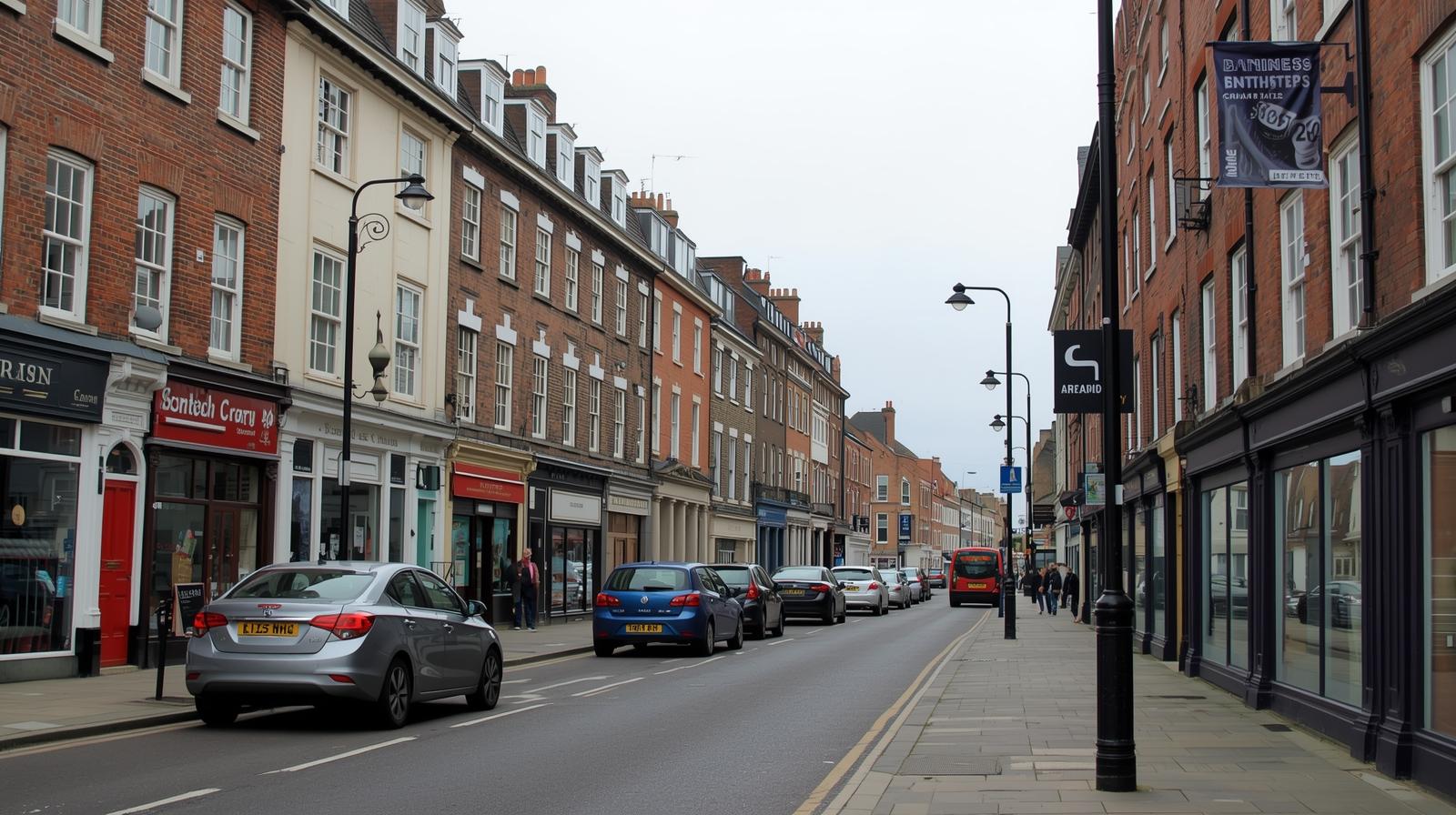Business
Business Rates England Understanding How They Work for Your Business
Published
4 months agoon
By
Admin
Running a business in England comes with several costs, and one of the most important to understand is business rates. Whether you run a small shop, a restaurant, or an office, business rates are part of your financial responsibilities. These rates help fund local services like street lighting, waste collection, and emergency services that benefit both businesses and communities.
This detailed guide explains what business rates are, how they’re calculated, who pays them, available reliefs, and how you can manage them effectively in England.
What Are Business Rates in England?
Business rates, also known as non-domestic rates, are a form of property tax paid by businesses that occupy commercial properties such as offices, shops, factories, or warehouses. The money collected goes to local councils, which then use it to maintain local infrastructure and services.
They’re similar to council tax, but while council tax is for residential properties, business rates apply to non-residential properties. Even if you work from home, you might have to pay business rates depending on how much of your home is used for business purposes.
Who Has to Pay Business Rates?
If you use a building or part of a property for business purposes in England, you’ll likely have to pay business rates. This includes:
- Shops and retail stores
- Offices and coworking spaces
- Pubs, cafes, and restaurants
- Warehouses and factories
- Guesthouses or holiday rentals
- Commercial garages or workshops
In some cases, if your business operates from your home, such as a hair salon or small studio, you may still be charged business rates depending on how your space is used.
How Business Rates Are Calculated
Business rates in England are calculated using two key factors: the rateable value and the multiplier.
- Rateable Value:
This is the estimated market rent of your property as determined by the Valuation Office Agency (VOA). The VOA updates these values every few years to reflect current property market conditions. - Multiplier:
The multiplier is a pence-per-pound value set by the government. It changes annually and determines how much you pay based on your property’s rateable value.
For example, if your property’s rateable value is £20,000 and the multiplier is 51.2p, your annual bill before reliefs would be:
£20,000 × 0.512 = £10,240
Small Business Rate Relief (SBRR)
The UK government supports small businesses through Small Business Rate Relief (SBRR). This relief helps reduce or eliminate business rates for small enterprises.
You may qualify if:
- Your property’s rateable value is less than £15,000.
- You use only one property (or multiple but with a combined low value).
Relief levels:
- Properties under £12,000 rateable value: No business rates to pay.
- Between £12,001 and £15,000: Partial relief is applied on a sliding scale.
This relief can make a big difference for small business owners trying to manage cash flow.
Other Business Rate Reliefs in England
Apart from SBRR, there are several other relief programs:
- Rural Rate Relief:
For businesses in rural areas with populations under 3,000. For example, the only village shop or pub may receive 100% relief. - Charitable Rate Relief:
Charities and non-profit organizations may get up to 80% mandatory relief and sometimes additional discretionary relief from councils. - Enterprise Zone Relief:
Businesses moving into government-designated enterprise zones can receive up to £275,000 in rate reductions over five years. - Transitional Relief:
Helps limit large increases in bills after a revaluation.
These programs ensure fairness and encourage business growth across England.
How to Check Your Business Rates
You can check your business rates online through the Valuation Office Agency (VOA) or your local council’s website.
To check:
- Visit the official GOV.UK business rates page.
- Enter your property’s postcode.
- View your rateable value and current billing details.
You can also contact your local authority to discuss your bill, payment methods, or eligibility for reliefs.
Paying Your Business Rates
Most local councils issue a business rates bill every February or March for the following tax year (April to March). Payments can usually be made:
- Monthly by Direct Debit
- Quarterly or annually
- Online via council portals
Late payments may result in penalties or legal action, so it’s best to set reminders or use automatic payments to avoid extra charges.
Business Rates Revaluation
The VOA regularly revalues properties to ensure the rateable values reflect the current rental market. The latest revaluation took place in April 2023, based on rental values from April 2021.
Revaluations help maintain fairness — when property rents rise or fall, business rates adjust accordingly. This means that if your property value decreased, your rates might go down too.
However, if you think your valuation is incorrect, you can challenge it through the VOA’s “Check and Challenge” process.
Business Rates for Home-Based Businesses
Many people run small businesses from home, such as graphic designers, online sellers, or hairdressers. You usually don’t have to pay business rates if you:
- Use a small part of your home (like a bedroom office).
- Don’t employ staff at your home.
- Don’t have regular customer visits.
However, you might have to pay if:
- You’ve converted part of your home into a workspace (like a salon or studio).
- You sell products or services directly from your property.
- You rent out a portion for business use.
Always check with your local council if you’re unsure.
How to Reduce Your Business Rates
Here are some tips to reduce your business rates:
- Apply for all reliefs: Always check if you qualify for SBRR or other local schemes.
- Challenge incorrect valuations: If your property’s rateable value seems too high, file a “Check and Challenge” with the VOA.
- Consider shared spaces: Renting smaller or shared offices reduces your rateable value.
- Use enterprise zones: Relocate your business to areas that offer government incentives.
- Ask for temporary relief: If your business is under renovation or facing hardship, councils may grant temporary reductions.
These strategies can save you thousands of pounds annually.
Impact of COVID-19 on Business Rates
The pandemic significantly affected UK businesses, leading to government support through:
- 100% business rate holidays for retail, hospitality, and leisure sectors (during lockdowns).
- Special grants and reliefs to help recovery.
Although most of these have now ended, some councils still offer local recovery support for eligible businesses.
Future of Business Rates in England
The UK government has discussed reforming business rates to make them fairer and more modern. Some expected changes include:
- More frequent revaluations (every 3 years).
- Better online tools for checking and paying.
- Simplified relief systems.
Digital transformation may also make the process faster and more transparent for businesses of all sizes.
Common Problems and Solutions
- High bills: Check if your valuation is accurate and apply for reliefs.
- Late payments: Contact your council early to arrange payment plans.
- Confusion about eligibility: Use GOV.UK’s business rates checker or contact your local authority for clarification.
Staying informed and proactive can prevent unnecessary financial stress.
Why Business Rates Matter
Business rates are crucial because they fund public services that help businesses operate safely and smoothly — like road maintenance, local safety, and community improvements.
By paying your rates on time, you’re not only supporting your local council but also investing in a cleaner and more organized business environment.
Final Thoughts
Understanding Business Rates in England is essential for anyone running a company, shop, or local service. These rates may seem complicated at first, but once you know how they work, you can plan your finances better and even reduce your payments through reliefs and smart property use.
As the government continues to modernize the system, staying updated ensures you’re never overpaying or missing out on valuable support programs. Whether you’re a new entrepreneur or an established business owner, knowing your responsibilities around business rates can help you run your operations more efficiently and confidently.
FAQ
Q: Who pays business rates in England?
Anyone using a commercial or non-domestic property, such as shops or offices, must pay business rates.
Q: How are business rates calculated?
They are based on your property’s rateable value (set by the VOA) multiplied by the government’s annual multiplier.
Q: Can I get relief from paying full business rates?
Yes, small businesses and certain organizations can apply for various reliefs like SBRR, rural, or charitable reliefs.

Graduations, Pouch Pizza, Purchase Games, and ZipperGitsFh: A Modern Digital Culture Story

Unlock the Thrill: Why Independent Casinos Sites Are Better

The End of Forms: Why No-Registration Casinos Are Taking Over

The Best Online Casinos: Why Experience Matters More Than Luck

Understanding “inurl:home.htm intitle:1766” and Why People Search It

Home Gym Meteorology Shop: Evaluating Fitnara for Smart Fitness Choices

The Future of Gaming is in Your Hands: Why PayByMobile Casinos Change Everything

Discover the Elite: Why the Top 50 Online Casinos UK Set the Standard

Unleash the Thrill: Discover the Ultimate Experience at Basswin Casino

The Gold Standard: Defining the Best Online Casinos in the UK

The Gold Standard: Defining the Best Online Casinos in the UK

Discover the Elite: Why the Top 50 Online Casinos UK Set the Standard

Unleash the Thrill: Discover the Ultimate Experience at Basswin Casino

Fresh Spins & Big Wins: Unlocking the Best New Casino Bonuses in the UK

Home Gym Meteorology Shop: Evaluating Fitnara for Smart Fitness Choices

The Future of Gaming is in Your Hands: Why PayByMobile Casinos Change Everything

The Best Online Casinos: Why Experience Matters More Than Luck

Understanding “inurl:home.htm intitle:1766” and Why People Search It

The End of Forms: Why No-Registration Casinos Are Taking Over

Unlock the Thrill: Why Independent Casinos Sites Are Better

Graduations, Pouch Pizza, Purchase Games, and ZipperGitsFh: A Modern Digital Culture Story

Unlock the Thrill: Why Independent Casinos Sites Are Better

The End of Forms: Why No-Registration Casinos Are Taking Over

The Best Online Casinos: Why Experience Matters More Than Luck

Understanding “inurl:home.htm intitle:1766” and Why People Search It

Home Gym Meteorology Shop: Evaluating Fitnara for Smart Fitness Choices

The Future of Gaming is in Your Hands: Why PayByMobile Casinos Change Everything

Discover the Elite: Why the Top 50 Online Casinos UK Set the Standard

Unleash the Thrill: Discover the Ultimate Experience at Basswin Casino









